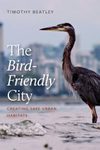![The Nature of Design The Nature of Design]()
Click to have a closer look
About this book
Contents
Customer reviews
Related titles
About this book
The environmental movement has often been accused of being overly negative – trying to stop "progress." The Nature of Design, on the other hand, is about starting things, specifically an ecological design revolution that changes how we provide food, shelter, energy, materials, and livelihood, and how we deal with waste. Ecological design is an emerging field that aims to recalibrate what humans do in the world according to how the world works as a biophysical system. Design in this sense is a large concept having to do as much with politics and ethics as with buildings and technology. The Nature of Design begins by describing the scope of design, comparing it to the Enlightenment of the 18th century. Subsequent chapters describe barriers to a design revolution inherent in our misuse of language, the clockspeed of technological society, and shortsighted politics. Orr goes on to describe the critical role educational institutions might play in fostering design intelligence and what he calls "a higher order of heroism." Appropriately, The Nature of Design ends on themes of charity, wilderness, and the rights of children. Astute yet broadly appealing, The Nature of Design combines theory, practicality, and a call to action.
Contents
I. The Problem of Ecological Design
1: Introduction: The Design of Culture and the Culture of Design
2: Human Ecology as a Problem of Ecological Design
II. Pathologies and Barriers
3: Slow Knowledge
4: Speed
5: Verbicide
6: Technological Fundamentalism
7: Ideasclerosis
8: Ideasclerosis, Continued
III. The Politics of Design
9: None So Blind: The Problem of Ecological Denial (with David Ehrenfeld)
10: Twine in the Baler
11: Conservation and Conservatism
12: The Politics Worthy of the Name
13: The Limits of Nature and the Educational Nature of Limits
IV. Design as Pedagogy
14: Architecture and Education
15: The Architecture of Science
16: 2020: A Proposal
17: Education, Careers, and Callings
18: A Higher Order of Heroism
V. Charity, Wildness, and Children
19: The Ecology of Giving and Consuming
20: The Great Wilderness Debate, Again
21: Loving Children: The Political Economy of Design
Bibliography
Index
Customer Reviews























![A4A: Architecture for Animals [English / Italian]](http://mediacdn.nhbs.com/jackets/jackets_resizer_medium/24/244049.jpg?height=150&width=113)












